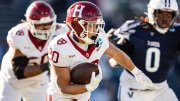Harvard athletes have a long history of Olympic competition, beginning with the first modern games at Athens in 1896 (see “The Unexpected Olympians,” July-August 1996, page 36). This summer, 10 current and former Crimson athletes turned in memorable performances in Beijing, capturing two gold and two silver medals.
In rowing—a traditional Harvard strength—Caryn Davies ’05, who led the Radcliffe crew to a national championship in 2003, stroked the powerful United States women’s eight to victory, staving off a late surge by the Netherlands. In the men’s heavyweight event, her classmate Malcolm Howard, a veteran of three national-championship Harvard crews who was rowing in the five seat of the confident Canadian eight, earned gold in a win over Great Britain. In the women’s single sculls, Michelle Guerette ’02, coached by Harvard men’s lightweight coach Charley Butt, took the silver medal. In fifth place at the halfway mark, she put together what she called her “best race ever” over the subsequent 1,000 meters, finishing just 0.44 seconds behind Rumyana Neykova of Bulgaria, and 1.2 seconds ahead of two-time Olympic champion Ekaterina Karsten of Belarus.
In the men’s pair final, twins Cameron and Tyler Winklevoss, both class of ’04, placed sixth. After finishing last in their opening heat, they handily won their repechage two days later, earning a spot in the semifinal competition; there, they battled back from an early deficit to place second. In the men’s lightweight fours, Patrick Todd ’02—a six-time national team member—finished eleventh.
In men’s tennis, James Blake ’01 (see “Brotherhood at the Baseline,” July-August 1998, page 76) staged a stunning upset of number-one-ranked Roger Federer of Switzerland in the quarterfinals on August 14, winning in straight sets, 6-4, 7-6 (2). But the next day Blake, who left Harvard after his sophomore year to play the pro circuit, lost a tightly contested semifinal match to Fernando Gonzalez of Chile, 4-6, 7-5, 11-9; in the bronze-medal match with Novak Djokovic of Serbia, he lost in straight sets, 6-3, 7-6 (4).
The unlooked-for success is often the most spectacular, and such was the case in fencing. Emily Cross ’08 (’09), a 2005 NCAA champion, and Noam Mills ’12, the number-one junior épéeist in the world in 2006, both lost in the round of 32 in individual competition. But Cross (see “Wild on the Strip”, January-February 2006, page 53) had the chance to redeem herself in the team foil competition, and she did, scoring 31 touches in three rounds to lead Team U.S.A. to the silver medal. Against defending world champion Poland, the seventh-seeded Americans scored a tremendous upset in the opening quarterfinal round, 31 to 30. Then, in the semifinals against Hungary, Cross was on fire, scoring 16 of the team’s 35 points, including a 7-1 victory in her eighth bout that gave the U.S. an insurmountable lead. In the gold medal match, Cross beat her first opponent from the top-ranked Russian team, but the Russians ultimately proved too strong. Even so, by helping her teammates win silver, Cross became the first Harvard fencer ever to win an Olympic medal.
At the Paralympic Games in Beijing two weeks later (September 6-17), swimmer Beth Kolbe ’08 competed in the 50-meter backstroke and 50-meter freestyle events. Placing eighth and fourth, respectively, she set a new American record in the freestyle event in the process.
Further details of Harvard Olympians’ Beijing experiences appear at www.gocrimson.com.








